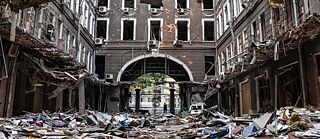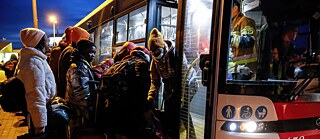24th February 2022 Wars and Days

What is the war in Ukraine doing to us helpless onlookers? Croatian writer Marko Pogačar gives a deeply personal account of how he experienced the day Russian troops invaded Ukraine.
Days are dangerous. Every hour of every day, somebody dies. Diaries are equally dangerous: every page is a trap in which mistakes lie in wait, barely visible larvae that are bound to morph into a violent death sooner or later.On 2nd August 1914, Kafka – the unhappy, precise, elaborate Kafka who sees literature as an axe for the frozen sea within us – made a terse and oft-quoted entry in his diary: “Germany has declared war on Russia. Went swimming in the afternoon.” The threshold to the First World War had just been crossed irrevocably. A complex concatenation of causes and impulses that would fundamentally shake up history and lead us to the world as we now know it had come to a head. The First World War would be the prelude to a second one, in which Kafka’s people were doomed to go up in smoke – “graves in the skies” that the Jews are forced to dig for themselves in Todesfuge (Paul Celan's Death Fugue). These mass murders and the silent Cold War that followed were to give rise to a geopolitical configuration whose consequences we have to live with today. The world has of course changed radically and profoundly since that warm afternoon in Prague in 1914. It has, in a sense, along with us, lost its apparent innocence.
No need to point out the obvious: when penning this diary entry, Kafka could not have guessed what lay ahead. We who enter 24th February 2022 in our casual diaries – just like these diarists who were gravitated towards paper on 1st September 1939 for the same reason – do not and will never have the same luxury again. This is a global and globally abominable world battered by the experiences of the 20th century - an instantaneous and interconnected world enlightened by the tiny red light of the nuclear threat. A world that we, as a society – to use an increasingly abandoned and forgotten catch-all term –, may find despairingly different when we wake up any morning.
Silent Stones
It’s of no importance to anyone but me how and why I remember this day. What should concern us all, however, is, above all, how its victims experienced and still experience it – those victims, that is, whose lives haven’t been taken by a crime in the meantime. Because this is precisely what these dark, noose-like knots of history come down to: people with first and last names are robbed of their lives and then get silent stones named after them.I know exactly where I was and what I was doing when on 11st September 2001 the news of the attack on the solar plexus of America went round the world. There is already no doubt in my mind that I will remember 24th February 2022, even more intensely – and with the palpable fear that it will be a long time before circumstances allow us to brush this memory aside, to disregard it, to consign it to the heap of global trauma and drown it in everyday details, of which many have to do with the considerable number of deaths. The dead, who we allow day in and day out not to constantly occupy our mind. Because the hiding of similar facts is a precondition for our own, more or less “normal life”. The kind of life, which people everywhere in Ukraine are robbed of right now.
The Horror of Normality
So many times in life, owing it to some chance occurrence or being beyond my control, I have felt incredibly privileged – above and beyond the fact of being a white European male who grew up in what can pass for a middle-class family. Now I’m privileged again: while bombs are raining down on Ukraine’s cities, I find myself for several months in Switzerland. In a country that has been neutral since 1815 and has richly profited from its neutrality and only reluctantly joined in the European sanctions. And the only country, according to the press, with properly maintained nuclear fallout shelters of sufficient capacity. Hence is the perspective from which I am writing these words rather unpardonably pleasant, and dancing on the disgusting edge of cynicism, while all our lives, whether we realise it or not, have changed fundamentally.Thanks to this privilege, I get to sit in a warm room, possibly heated with Russian gas, feverishly taking notes on all the news I can get my hands on. Day after day, I try not to lose contact with my Ukrainian friends. I wander through pessimistic geopolitical, strategic and ideological black holes that warrant a separate contribution. Hereby I recognise the gravity of my own mistake: To the last moment, I didn’t think there would actually be such a war. And it drives me out of the horror of the present and into memories of the past, of the Ukraine I know – which I have travelled in by train back and forth several times, where my books have been translated, where I still have so many friends and acquaintances who are forced to take up arms or leave the country on those same trains – in short: the peaceful, sleepy, wonderful, gigantic Ukraine of my imagination is disappearing before our very eyes. How should anyone feel, sitting around well-fed and helpless in a warm room while people and whole cities are disappearing around him? This person has felt – pardon my expression – like a piece of shite since 24th February 2022.
Human beings always end up returning to their own past, not only on account of the well-known relief of forgetting: last Thursday left an even more terrible and overpowering impression on me than, say, the 15th September 1991, when my hometown was shelled – though fortunately just for a little while. I know that was another collected memory of being privileged: for at the time, as the sirens signalled an air raid and general alarm, I was just a primary school child sheltering in the overcrowded basement of a high-rise apartment building and, like Kafka in his world, still apparently innocent. Fear had no rational basis. Life unfolded in the eternal now. There was no tomorrow. I was still in the golden age, the only one that really exists: the age before the fear of your own and others’ death sets in. A little over thirty years have gone by since then. Time has entered my life with big steps – and swept away all illusions. Now I know what comes after days like these. Days we would rather like to forget, but we never can. We simply have no right to forget. No one has ever been granted that privilege.
It is our duty to remember the dead – and, far more importantly, to be with the living any way we can.
This article was written on 3rd March 2022.


